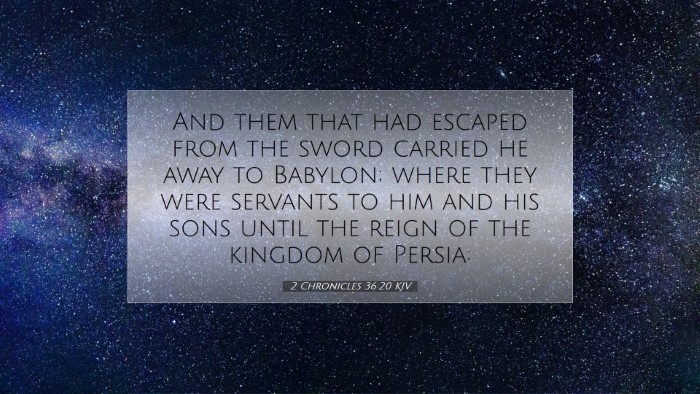Commentary on 2 Chronicles 36:20
Verse: "And them that had escaped from the sword carried he away to Babylon; and they were servants to him and his sons until the reign of the kingdom of Persia."
Introduction
This verse marks a critical turning point in the history of Israel, encapsulating the consequences of disobedience and God's judgment. It illustrates the deportation of the people of Judah and the profound impact of the Babylonian captivity on the nation. In this commentary, we draw from the insights of respected public domain scholars such as Matthew Henry, Albert Barnes, and Adam Clarke, to provide a comprehensive understanding of this text and its implications for contemporary readers.
Contextual Background
To fully grasp the significance of 2 Chronicles 36:20, it's essential to contextualize it within the broader narrative of Israel's history. Following a series of rebellions against God, the nation of Judah faced impending doom. This captivity highlights the fulfillment of prophetic warnings uttered by Jeremiah and other prophets concerning Israel's unfaithfulness.
Matthew Henry's Perspective
Matthew Henry emphasizes the notion of divine retribution in his commentary. He asserts that the judgment on Judah was not arbitrary but rooted in a long history of transgressions. Henry notes that the conquest and captivity were direct results of the people's persistent rebellion against God’s covenant. This verse identifies those who survived the initial conquests by sword as being taken captive, thus underscoring the harsh realities of divine discipline.
Albert Barnes' Interpretation
Albert Barnes provides additional insights, focusing on the impact of the Babylonian exile. He explains that those who escaped the sword were not merely survivors but were subjected to servitude under foreign rulers. This servitude was both a physical and spiritual exile—a stark reminder of their loss of autonomy and spiritual heritage. Barnes highlights how this period would serve to purify and prepare a remnant for eventual return and restoration.
Adam Clarke's Insights
Adam Clarke elaborates on the prophetic implications of this deportation. He claims that this was God's way of disciplining His people, but also a precursor to their eventual redemption. Clarke emphasizes the notion that the time spent in Babylon would later foster a longing for their homeland and a return to true worship. This view positions the verse as not just an end, but part of a larger redemptive arc for Israel.
Theological Reflections
This verse provides profound theological insights that resonate with modern believers. The themes of judgment, grace, and hope are woven throughout this narrative, offering rich material for reflection and application.
Divine Sovereignty and Human Responsibility
One of the key takeaways from 2 Chronicles 36:20 is the interplay between divine sovereignty and human responsibility. God’s judgment on Judah is a vivid reminder that while He is sovereign over the nations, human actions bear consequences. The chronicler presents a historical account that urges readers to consider their relationship with God, encouraging them to seek faithfulness amidst trials.
Hope Amidst Judgment
Even in the depths of despair, the deportation serves as a backdrop for hope. As noted by Clarke, this period would not only be a time of judgment but also of purification and preparation. The eventual return from exile signifies God’s faithfulness to His covenant promises. This narrative can inspire contemporary believers to recognize that, despite personal or collective failures, God's redemptive work is ongoing.
Lessons for Today’s Church
The insights gleaned from 2 Chronicles 36:20 are not confined to the context of ancient Israel; they carry significant lessons for the church today. Here are several key applications:
- Complacency and Disobedience: The history of Judah serves as a cautionary tale against complacency in faith. The church is urged to remain vigilant and faithful to God’s commands, understanding that disobedience can lead to dire consequences.
- The Need for Repentance: Just as Judah’s exile was a moment of reckoning, the church today is called to examine its spiritual health and seek authentic repentance, relying on God's grace for restoration.
- Hope for Redemption: In times of trouble, believers are reminded that God can bring good from difficult situations. The narrative of exile leads to renewal, underscoring the hope found in Christ.
- Emphasis on Community: The collective suffering of Judah emphasizes the need for communal worship and accountability within the body of Christ. The church is called to support one another in faithfulness to God’s commands.
Conclusion
2 Chronicles 36:20 serves as a poignant reminder of the profound consequences of sin, the reality of God's judgment, and the hope that arises from repentance and grace. The insights from Matthew Henry, Albert Barnes, and Adam Clarke enrich our understanding, challenging us to reflect on our own lives and the corporate life of the church. As we consider this verse, may we strive for faithfulness and embrace the restorative power of God's covenant love.


